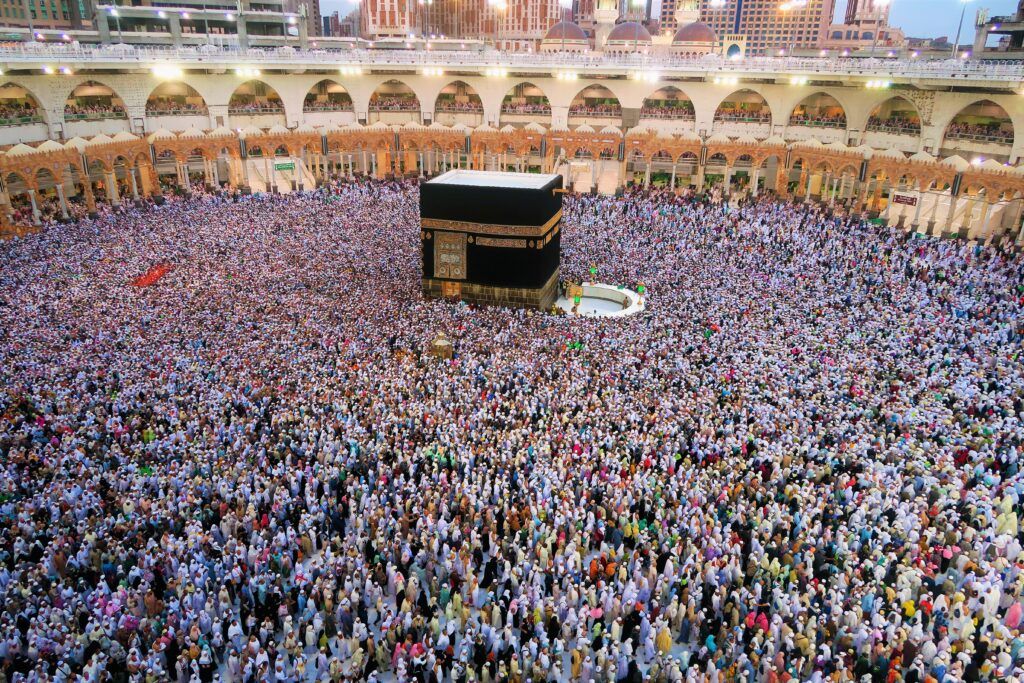“Hajj is ʿArafāt…” ﷺ
On this barren plain millions of people stand and sit asking Allah ﷻ to forgive them a lifetime of sin and misdeeds. Some are inside tents, others are standing under the beating sun. Some are in tears as their lives pour out into their duʿāʾ, others cannot think of anything to say.
I sat on a white plastic chair, placed in front of a white wall that jutted out from our tent, next to a thirsty tree. Next to me a woman lay on the ground with a circle of beads in her gray and wrinkled hands. I felt blessed and lucky to have found this prime piece of real estate. All around me people looked for places to be alone amidst the millions; they looked for a place to seek forgiveness. Though crowded there was a hush upon us all. A quiet that surrounded us, while our brains and hearts whirred with the noise of repentance.
Many people have likened hajj to the Day of Judgment. A day of crowds. A day when people will forget about each other and only think about their accounting before God. I wonder at this analogy. I imagine the Day of Judgment to be a day of fear and apprehension as each of us awaits our reckoning. My ʿArafāt did not feel like Judgment day. It was, instead, a quiet slip into the arms of the Beloved ﷻ. As I poured out my thirty years of sin, I did not feel afraid. I felt loved.
When I was sixteen I crashed my mother’s new car. I went home shaking from the accident and frightened of her reaction. She didn’t hesitate. Love, care and understanding. She made sure I was OK and then sent me back to get the car and drive it home. She was loving me and my mistake and teaching me that I was not my mistake.
At forty-seven years old, without credit because I hadn’t lived in the USA for twenty years, I dragged my father to a car dealer on a Saturday to sign for my car lease. He didn’t hesitate. Love, care and support. He was there to solve the problem of my credit history, added money to the down payment so that I could get a fancier car, and sent me home. He was loving me and my inadequacies and teaching me that I was not them.
All throughout life we learn from parents, our spouse, our children, our relatives, our friends, our bosses, our teachers, our neighbors, we learn from the people around us that forgiveness and acceptance are real and possible. Allah ﷻ created us and gave us hearts that can forgive and can accept.
ʿArafāt is the day we understand forgiveness and acceptance in its Divine sense.
As I sat on my white plastic chair and sobbed into my upturned hands, I felt a love that went beyond the love of mother and father, it was far more substantial than romantic love, and it was more powerful even than the love of a child.
This was the love of Rumi and Ibn ʿArabī. I recognized the failed attempt of poets to try and contain this Love in words.
I had come to this sacred place in this sacred time with thirty years of sin. A mountain of burden had sunk into the mountain of Mercy.
I spent the rest of the day sitting on the white plastic chair. I prayed for my children, my husband, my family. I prayed for my students and teachers. I prayed for my beloved Sham and all the countries of the world. I had a new heart. I was thankful, happy and still not quite sure what it all meant.
But I knew one thing – I had done Hajj, because Hajj is ʿArafāt.

